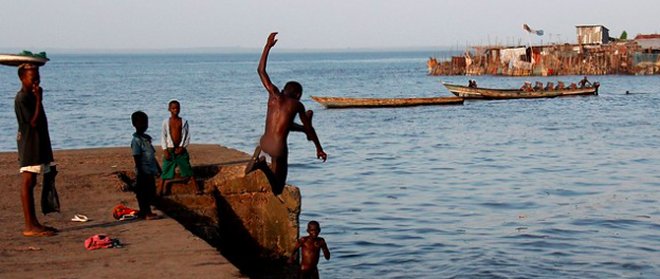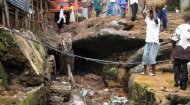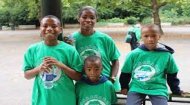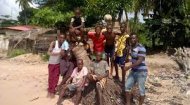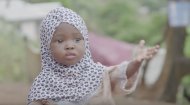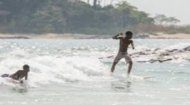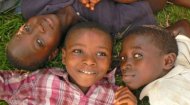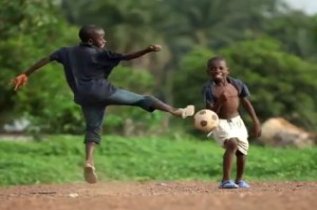
|
Children in Sierra Leone |
Children in Sierra Leone |
Children in Sierra Leone | Children in Sierra Leone |

|
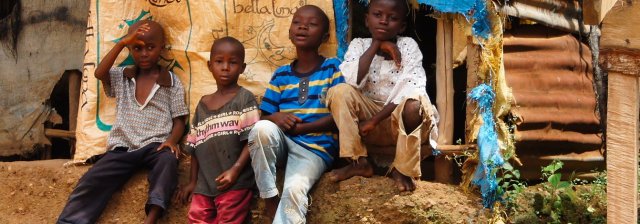
|
Rural Sierra Leone faces significant challenges with sanitation, where only 37.9% use improved facilities and 26% still practice open defecation, according to a 2023 report. This low access contributes to health problems like diarrhea and hinders development, as much of the infrastructure is inadequate or non-functional. Efforts are underway, including community-based initiatives and projects supported by organizations like the African Development Bank, to improve access to safely managed sanitation and hygiene services. Washing is normally done in nearby rivers and water collected from wells of pumped sources. Children in Sierra Leone eat a diet of rice, cassava root, and leafy greens supplemented, when available, by fish. mice, rats, monkey meat or chicken. The country continues to experience high rates of chronic malnutrition, affecting roughly 6.3% of children under five with around 26% of children under five stunted (a form of chronic malnutrition). Progress has been limited in improving diet quality, as only a small percentage of children under two receive an adequate diet. Polygamy is common place in Sierra Leone with children growing up within extended families often including aunts, uncles and grandparents. Given the war and health in the country, a high number all households are made up of just children and young people under the age of 18yrs with no adult carer. Child labour, not that is seen as such in the country, involves 31% of children ages 5-11yrs being lowest in the Western Region (13%) and highest in the Southern Region (46%) of the country. For those children in Sierre Leone attending school, school day starts at 8am and finishes at 2.30pm. The first nine years of education are compulsory and start with primary education (6-12yrs), then junior secondary education of three years and finally three years of either senior secondary education or technical vocational education after which for some four years of university or other tertiary education may be available to successful candidates. At the end of primary education, children take the Basic Education Certificate Examination (BECE) and, if they pass, are awarded the National Primary School Certificate that informs what type of further secondary education they will attend (if they stay on) ~ specialist or technical/vocational (often agriculture/carpentry/brickwork etc.) Those sudents in junior secondary school who are in technical and vocational tracks can, on completion, enter the workforce or continue their formal education in a technical/vocational institute, while to qualify for entry to the Senior Secondary School WASSCE program, a candidate must obtain a minimum of Unit/Grade 6 in five or more subjects including Language, Arts or Mathematics. In 2025 the Sierra Leone National Primary School Certificate (NPSE) pass rate was 78.2%, with a total of 171,112 pupils sitting the exam, with 128,766 passing. The figure for the WASSCE pass rates are not known although what figures are available suggest a 19.7% pass rate for English among the results released (other figures were witheld due to 'discrepancies') and a significantly higher 46% pass rate was reported for Mathematics. Nevertheless, it is widely recognised that education for children in Sierra Leone is improving, spurred on by the election of Julius Maada Wonie Bio as President in 2018 who, on taking office, introduced free education to the more than 1.5 million primary and secondary students and nearly doubled the country's education budget. Today it stands at 6.79% of its GDP in 2023 (latest figure available), according to TheGlobalEconomy.com, although this figure shows a decrease from the 2022 value of 8.54% but still higher than the world average of 4.40%. Bio also made teacher training free and opened training institutes across the country. Sierra Leone has a large orphan population, estimated to be around 310,000 children, due to hardships including the long civil war, the Ebola and COVID-19 pandemics, and ongoing poverty, which often results in parental death from disease, malnutrition, and lack of healthcare. Various local and international organizations are working to support these children by providing education, food, shelter, and healthcare, as well as reuniting them with extended family when possible, and fostering community-based care. As one child commented "I feel like I have no purpose, like there is no meaning to it .... I have to struggle just to get clothes for us. I beg to eat." Life is tough enough for all children in Sierra Leone, however, without education nor social support many of these orphans ended up on the streets of towns like Freetown and many more former child soldiers found themselves unable to adjust to any form of normality having learned one lesson in life, how to grasp power through violence. However there are organisations such as SOS Children's Villages who have been working hard for decades, even before the civil war, to provide the best care possible for these children, even when their own staff and facilities came under rebel attack during the war. Left is a video about life for children in Sierra Leone and also projects and programs that work with children in the country you may wish to support. |
